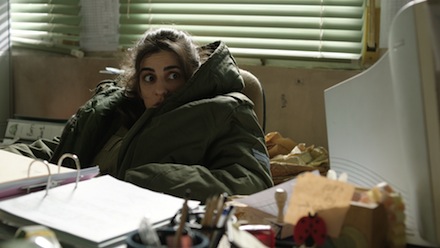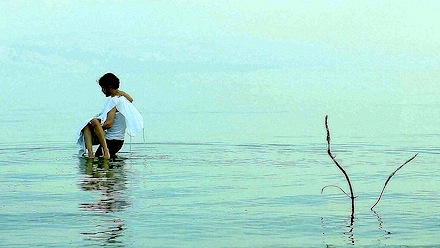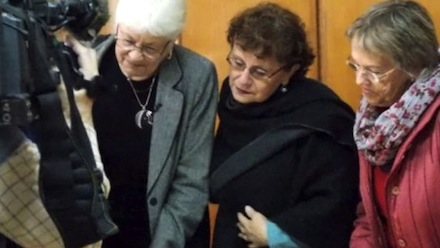Milano’s appointment with New Israeli Cinema has been renewed for the 9th year: CDEC (Centre for Jewish Contemporary Documentation) selected the best from the Roman Pitigliani Kolno'a Festival to analyse and evaluate the conditions of Israeli cinema. What are its favourite themes? What trends and problems can we identify in the Israeli society by watching the movies produced nationwide? What do the Israeli films of the last years tell us about the people, the ideologies, the creative ideas? The exhibition, with eleven movies, a lesson from the artistic director Dan Muggia and an interview with the director Raphael Vogel, tried to answer these questions. Through feature films and documentaries we were given a portrait of the complexity of Israeli cinema and society, with an important insight into the world of two social categories usually misrepresented or ignored by the cinema of the past years: women and religious people. It’s a fact that in recent times Israeli media society opened up to some social agents who previously did not have an active part in the art industry. Women are now telling their own version of their stories to the world; they are not just supporting roles anymore but main characters, and not only in the narrative path of the films: they are gaining more and more space and importance behind the movie cameras, too. If this is a cause or an effect of the changes in the society is still an open question: probably both, since the same thing is happening for the religious community. Haredim (ultra-Orthodox Jews) have always been quite suspicious of the media industry because Jewish religious culture is more word-based than visual. Lately, though, they are approaching the film industry pushed by the desire to tell their stories to the whole society. The religious community is in fact acknowledging the importance and the communicative power of the media and, even if in its own way, it is walking in this new road: a couple of cinema schools have been created and movies are being made by religious people under the guide of rabbis. The focus of this change is that religious people – who are now active part in the media industry also by being connected to some right-winged TV channels – want to portrait themselves and their world from their point of view. They try to explain their choices and their lifestyle in a way which could be appealing for non-religious men and women, in order to fight some prejudices which are after all present in Israel.
This is the context in which most of the films presented at the Spazio Oberdan in Milan are set. If we had to select just a few of them to give a photography of the feelings moving Israeli cinema researches, the choice would be hard, given the differences in tones, styles and approaches the directors choose to develop a theme or a character with.

"Zero motivation" , Talya Lavie |
|
For instance, Zero motivation (Talya Lavie, 2014), The kindergarten teacher (Nadav Lapid, 2014) and Mountain (Yaelle Kayam, 2015) have a woman as main character, but they are incredibly different movies.
The first one is a smart comedy set in the army, where the world of female soldiers is narrated as solely functional to the men’s universe and even if the events are told in a funny way the laughs they bring us to is often very bitter. The first feature film by this talented director opens the military world of the IDF to the female look, breaking the unwritten rule which restricted the army to that kind of things that could only be told by men and for men. And of course irony does not save female soldiers, either: there are really no heroes in this movie, men or women, and we could imply that the director is trying to spread a pacifist message to her audience, making us see how alienating the army service is sometimes.
|
 |
Trailer |
The kindergarten teacher, the only one of the trio directed by a man, is a drama about a woman (Nira) who tries to save a very young poet (Yoav) from the insensitive society he’s bound to live in. But one of the most important question the film poses is: do we need to save someone who doesn’t want to be saved? Nira’s passion slowly and strangely becomes an obsession, starting at some point to make us feel uncomfortable, thus questioning the smiles that had appeared on our faces. The journey this woman starts with the child is maybe a voyage inside her mind and her wishes, since she can’t accept the ineffective role that poetry has in the contemporary society. The words of this young boy strike her as words of someone “who has seen much beauty”, element her life is not so full of. Nira attends a weekly poetry class just to bring some poetry into her otherwise ordinary life and starts to pass off Yoav's poems as her own, with appreciation from her teacher, which inevitably suggests something about the director’s doubts on the role of teachers in art. Lapid’s camera often offers Nira’s physical point of view, especially in the kindergarten, where little boys and girls, looking at the camera, say “good morning” to her and therefore to us. In other moments, though, Nira is present in the frame but some parts of her are cut off: this happens mostly when she’s at home because she does not fit the world she lives in. Some other times Nira is framed from a relative bigger distance, as to separate her actions from the director’s point of view. It seems that Nira is a creature who lives on her own: sometimes the director shares her view of the world, but sometimes she frees herself from the embrace of the camera and walks on her own two feet to follow her choices and her destiny.
Mountain – Kayam’s debut feature film - is instead the story of a woman whose discovery of the sexuality threatens to affect her whole family life. Being set in the cemetery atop Jerusalem’s Mount of Olives, this movie really expresses the contrasts that can emerge in a religious woman: between spiritual world and physical world, between life and death, man and woman, love and sex, between different ways of interpreting life. Tzvia (Shani Klein) is followed by Kayam while she explores a reality that has nothing in common with the life she’s leading: she spots some people having sex in the cemetery and she herself is surprised by the curiosity which starts to monopolize her mind. Suddenly, sacred and profane are before her eyes, at the same time and in the same place, and she starts to be divided into two different women, soon to reveal themselves as incompatible: the devoted but neglected wife and caring mother versus the physical, freed woman. The choice she will have to make will be tragic.
Mountain, for its being at the crossroad between the “woman’s side of the stories” and the problems connected with being religious, was the perfect film to introduce us into the world of Jewish cinema. Vice Versa (Amichai Greenberg, 2015) and an extract from Sacred sperm (Or Yashar, 2014) were the two main examples of how religion is dealt with in Israeli contemporary cinema. While the second one tries to answer the question “How can I teach and explain to my children some fundamental things like the prohibition of masturbation?” in a way which is interesting even for the non-religious people, in

"Vice Versa" , Amichai Greenberg |
|
Vice Versa, more similar to a European melodrama, the teachings of Judaism are in contrast with the love that a young rabbi feels for a terminally ill girl. Even if the movie - based on the controversial novel by Yehoshua Greenberg, the director’s brother - is led by the questions “Can we repent? Can we go back in time?”, it does not offer a simple answer. Maybe because the director wants to point out that there is a question inside those questions: what do we really have to repent about? Do we really need to repent? The contrast between duty and feelings, heart and mind is the main path on which the footsteps of the characters move. Greenberg is able to highlight this dichotomy with a wise cinematography, in which lights and make-up underline the differences of the environments they live in: the Yeshivah, the hospital, their home... When they are together the image is brighter and more vivid.
|
 |
Trailer |
Three more films deserve a mention. The documentary Ronit Elkabezt, actress (Nir Bergman, 2010), part of the series Culture heroes which testifies the attention that Israeli cinema and TV pay to art and culture (the road followed by The kindergarten teacher) was shown in homage to Elkabezt, actress and director who unfortunately died a few weeks ago. The movie is a long interview to Elkabezt, who narrates the origins of her career, the difficulty of making some professional choices, the courage she had to leave Israel for France, her struggle to find her place in the cinema industry. Nir Bergman closely follows Ronit in her days on the set of a film, with her friends and colleagues, in her hotel room and, of course, down the path of memory, where she is moved by her own words. |
|

"Ronit Elkabezt, actress", Nir Bergman
|
Trailer |
 |

"Rinascere in Puglia" , Yael Katzir |
|
History and family chronicles are the rails on which some other films from the exhibition travel. Rinascere in Puglia (Shores of light; Yael Katzir, 2015) brings three Israeli women on the shores of Southern Italy, where they were born after the war, their parents having been hosted before leaving to Israel. Farewell Herr Schwarz (Yaelle Reuveny, 2013) tells the extraordinary story of two families (one in Germany and the other in Israel) learning they are related to each other. This documentary is narrated through the eyes of the young director, since this is the story of her own family. Farewell Herr Schwarz brings forth the tradition of Israeli directors who want to preserve the memory of their families through cinema (like Shahar Cohen’s Souvenirim or The Cemetery Club by Tali Shemesh), adding the reflection about the importance of not judging the past of our relatives and, moreover, the importance of the concept of family: is family just a blood tie? Is that just the environment we were grown up in? The question is open and this movie shows it’s not simple to answer.
|
 |
|
Three more films deserve a mention. The documentary Ronit Elkabezt, actress (Nir Bergman, 2010), part of the series Culture heroes which testifies the attention that Israeli cinema and TV pay to art and culture (the road followed by The kindergarten teacher) was shown in homage to Elkabezt, actress and director who unfortunately died a few weeks ago. The movie is a long interview to Elkabezt, who narrates the origins of her career, the difficulty of making some professional choices, the courage she had to leave Israel for France, her struggle to find her place in the cinema industry. Nir Bergman closely follows Ronit in her days on the set of a film, with her friends and colleagues, in her hotel room and, of course, down the path of memory, where she is moved by her own words.
The Farewell Party (Sharon Maymon and Tal Granit, 2014) proves the ability of Israeli directors to use the register of the comedy to talk about a very important and uncomfortable theme: euthanasia. Funny and moving, this is a smart film about the difficulty of ageing and the heart-breaking process of realizing that the future is becoming present, and that it is very hard to accept the consequences of that. This is an example of movies which unfortunately will not circulate in Italy, since it has not been bought by any Italian distributor.
Last but not least, Kicking out Shoshana (Shay Kanot, 2014) is a brilliant comedy which gradually destroys many stereotypes of the world of soccer and of society in general, talking about gender and homosexuality in a way which is light and deep at the same time.

"The Farewell Party", Sharon Maymon and Tal Granit |
|
The Farewell Party (Sharon Maymon and Tal Granit, 2014) proves the ability of Israeli directors to use the register of the comedy to talk about a very important and uncomfortable theme: euthanasia. Funny and moving, this is a smart film about the difficulty of ageing and the heart-breaking process of realizing that the future is becoming present, and that it is very hard to accept the consequences of that. This is an example of movies which unfortunately will not circulate in Italy, since it has not been bought by any Italian distributor.
Last but not least, Kicking out Shoshana (Shay Kanot, 2014) is a brilliant comedy which gradually destroys many stereotypes of the world of soccer and of society in general, talking about gender and homosexuality in a way which is light and deep at the same time.
|
 |
Trailer |
|